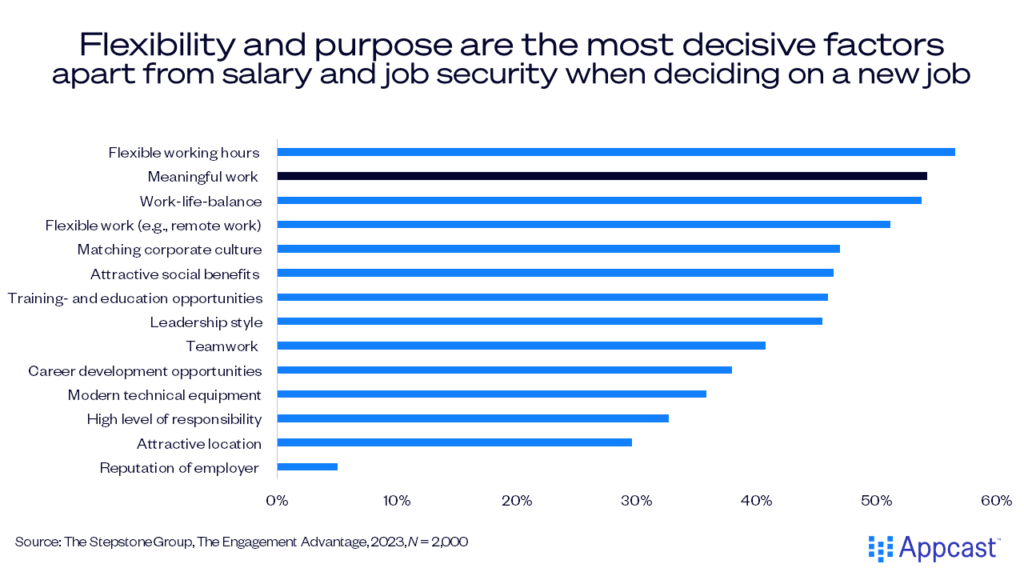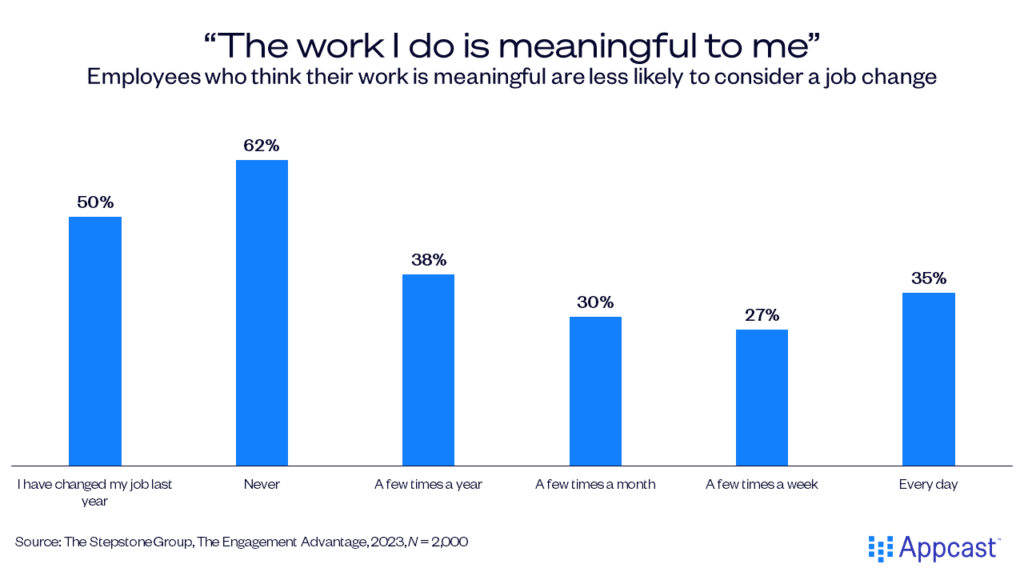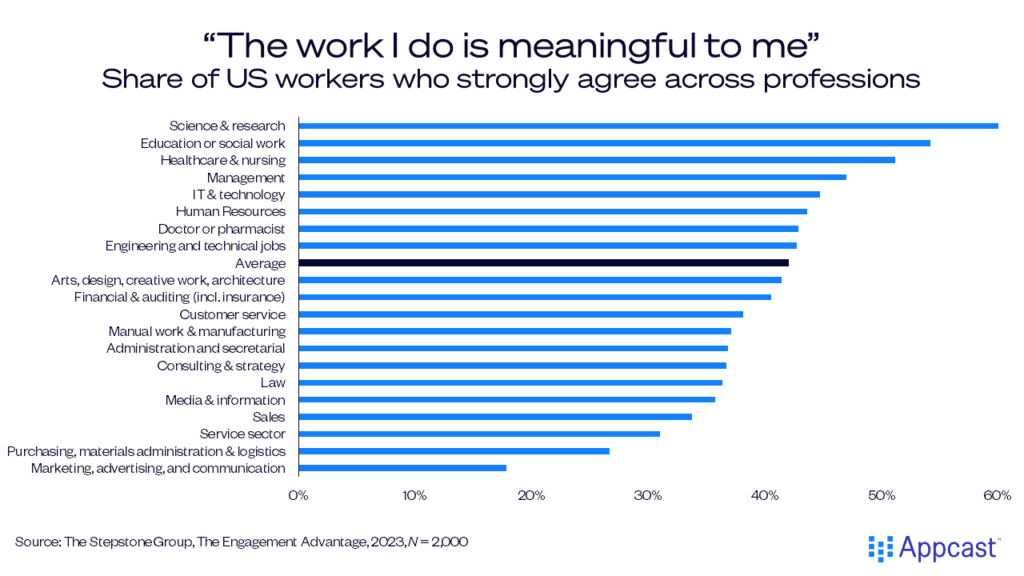Meaningful work improves retention
In today’s dynamic work landscape, the concept of organizational purpose stands as a powerful force. Organizational purpose not only directly enhances employees’ well-being and job satisfaction but also cultivates a trustworthy environment, fostering a profound sense of belonging and direction. The significance of organizational purpose extends to its role in attracting and retaining talent, as more meaningful work ranks among the top factors influencing workers’ decisions when considering a job change. On the other hand, employees who perceive their work as meaningful are notably less inclined to contemplate a change in employment: of those who never think about changing their job, 62% consider their job as meaningful. In comparison, of those who think about changing their job a few times per week, only 27% consider their job as meaningful.


Disparities in the perceived meaningfulness of work across occupations
A significant proportion of U.S. workers (precisely one in four) does not find their work to be personally meaningful. Upon closer examination of our data, it becomes apparent that certain professions elicit more meaningfulness. Notably, 60% of those employed in science and research and 54% in education or social work strongly affirm the meaningfulness of their work. Conversely, only 18% of individuals in marketing, advertising, and communication express a strong sense of meaning in their professional endeavors.

Where does this discrepancy arise from? There can be several contributing factors, but in certain occupations, the significance of one’s work is simply more readily apparent. Professions such as education, social work, or healthcare afford employees the daily opportunity to witness the tangible impact they have on others. The inherent nature of the work itself contributes significantly to its perceived meaning. However, in other occupations, employees’ work may indeed contribute to a meaningful organizational goal, yet this contribution is not immediately evident. Other factors that may lead people to not perceive their work as meaningful are a lack of awareness, appreciation, feedback, and safe relationships.
The difference between meaningful work and organizational purpose
This discrepancy highlights the distinction between meaningful work and organizational purpose. While meaningful work is contingent on an individual’s perception of their personal work situation, perceived organizational purpose transcends individual circumstances and represents the evaluation on an organizational level. As posited by Rosso et al. (2010), “the fact that work has a particular meaning does not necessarily determine that it is meaningful.” In essence, meaningfulness is a subjective measure of the significance something holds for an individual. Regardless of inherent characteristics, every task can be perceived as meaningful.
This implicates the heightened importance of organizational purpose for occupations where the direct perception of task meaningfulness is lacking, yet the tasks are crucial for achieving the common goals of the organization. In these instances, understanding and aligning with the broader organizational purpose becomes paramount in engaging employees. However, the best strategy would be to enhance both, the meaningfulness of work and perception of organizational purpose.
How to increase the meaningfulness of work
As mentioned earlier, every task can be perceived as meaningful and there are various strategies to enhance meaningfulness. Primarily, according to a comprehensive review by Lysova et al. (2019), individuals tend to derive a sense of meaning when afforded sufficient autonomy. While this may not be universally practicable, especially for entry-level positions where task selection isn’t always feasible, leaders can foster autonomy by engaging in discussions about task preferences and involving employees in shaping their roles.
Secondly, a pivotal aspect is a good person-job fit. The closer the alignment between job demands and an individual’s competencies, the smoother the journey toward perceived meaningfulness. Although this alignment naturally improves with career progression, investing effort in optimizing the person-job fit from the outset proves invaluable.
Thirdly, irrespective of the person-job fit, meaningfulness can be cultivated by setting meaning-supportive goals (this is where the significance of an organizational purpose that aligns with individual values comes into play).
Fourthly, nurturing meaningful relationships and building an environment characterized by cooperation, collaboration, and trust contributes significantly to the overall sense of meaning in tasks.
Lastly, leaders should elevate awareness about the utility of employees’ work. This involves them comprehending the broader context, and the leader providing information that underscores the significance of tasks.
Understanding the power of organizational purpose
Now that we have learned about the individual level, why is organizational purpose so important? First and foremost, organizational purpose transcends mere profit maximization, aiming to make a meaningful contribution to the common good. It serves as the guiding force behind all an organization’s aspirations in its day-to-day operations, acting as both a motivational driver for employees and a steadfast guiding principle. In a recent review published in the Journal of Management Studies, four conceptual dimensions of perceived organizational purpose are delineated:
- Contribution to the Common Good: The organizational purpose extends beyond self-interest, striving to create a positive impact and bring about constructive change in the world.
- Commitment in the Face of Conflict: The organization demonstrates a strong commitment to its purpose even amidst conflicts, embodying its core values as a consistent guiding force.
- Guidance in Complexity: Organizational purpose serves as a compass in complex situations, providing clear orientation that guides decision-making and actions both in daily operations and during periods of rapid change.
- Unity and Belonging: The organization fosters unity through its purpose, creating a sense of belonging among individuals who perceive themselves as part of something greater than individual roles or tasks.
Conclusion
In summary, recognizing the distinction between meaningful work and organizational purpose is crucial. Despite a positive correlation between these constructs, they remain inherently different. On the one hand, the perceived meaningfulness of work is contingent on its personal significance to an individual, along with alignment with their beliefs and skills. On the other hand, organizational purpose serves to unite individuals towards a broader, collective objective.
Decision-makers should be mindful that the perceived meaningfulness of work can vary across occupations. Therefore, proactive efforts to increase the meaning of individuals’ roles, through involvement in job design, enhancing awareness, or articulating an inspiring vision, become paramount. In the immediate term, organizations might entice talent with competitive salaries and benefits. However, the enduring motivation that fosters long-term commitment stems from the profound meaning and purpose embedded in the daily tasks and responsibilities of their work. That’s why, ultimately, the combination of meaningful work and a strong organizational purpose will prove to be the most powerful force for success.







